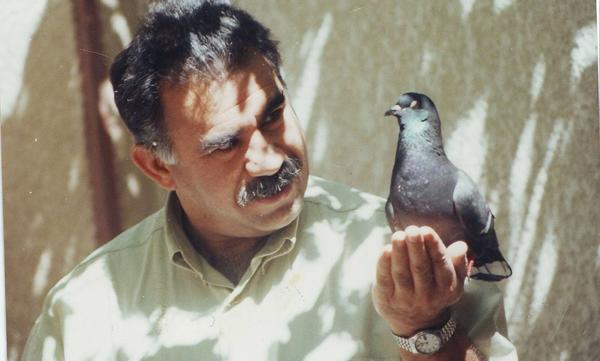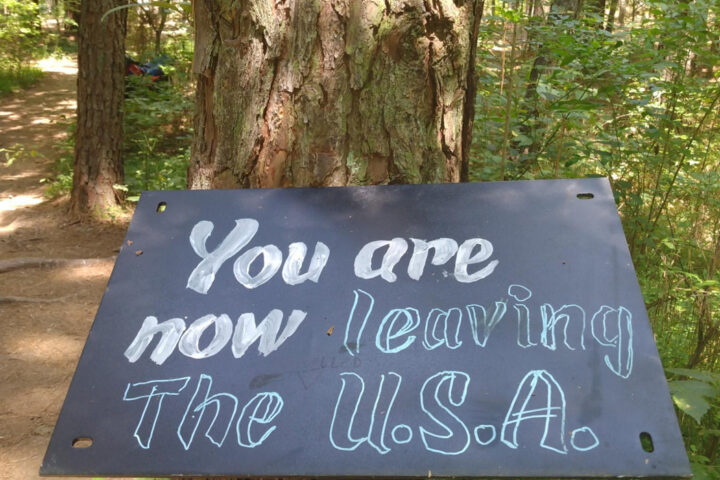Originally published in Spanish on www.elsaltodiario.com/buen-camino on 15th June 2020.
The task that the Kurdish revolutionary movement set itself was to break the concept of nation from the concept of state, realising a new synthesis of the elements of socialism, national liberation and democracy, in order to develop a radical and systemic alternative to the structural crisis of the capitalist system.
Why did the Soviet revolution, which according to the programme outlined in The State and Revolution was to dismantle the state form and to open the way for agency of the people in all spheres of their life, lead to a bureaucratic-military apparatus that was alien to the communist project in every way? Why did the national liberation struggles after the Second World War not only fail to fully emancipate the nation, but also generated new dynamics of national oppression? Why were the socialist revolutions of the last century incapable, as well as state appropriation of the means of production, of emancipating the workers from the alienation and the factory discipline of wage labour? Nor of bringing the social organisation that would control this process, and consciously put it at the service of human development? Why did past revolutions stop their emancipatory drive at the doors of the houses and at the patriarchal structures that enslave women, despite the fact that women throughout history constantly appear as the spearhead of these revolutions?
The collapse of the Soviet bloc and the integration of Real Socialism into the capitalist system not only meant the possibility to complete the neo-liberal counter-revolution that is hegemonic at the global level today. It also heralded a process of ideological disarmament of entire generations around the world, the loss of a worldview and of a horizon opposed to capitalist reality.
The development of the ideological paradigm of Democratic Modernity formulated by Abdullah Öcalan is a response to the need to reconstruct this universal horizon, from the point of view of the stateless Kurdish nation. The Kurdistan Workers’ Party (PKK), founded in 1978 as a Marxist-Leninist party in the image of the de-colonisation and national liberation movements of the time, evolved ideologically within this global process of crisis of socialism. The new paradigm was laid out by trying to synthesise the historical lessons of the freedom struggles that preceded it, and trying to explain them through a critical and deep investigation of the state form; specifically of the modern nation-state.
Öcalan states that “linking the right to self-determination with the vision of a state for each nation has been key to aggravating the problem” of conflicts arising from national oppression.
Socialist approach to the question of the state
If we analyse the history of socialist thought over the last centuries, we see that both anarchism and Marxism have seen the need to liquidate the state as an institution separate from society. The question that has confronted them has been rather the conditions under which this destruction of the state could occur. For the anarchist ideological tradition, the state must be destroyed in the very act of revolution: its abolition is the condition of possibility of politics itself. For the Marxist ideological tradition, on the other hand, it is the abolition of capitalist social relations that is the condition that allows for the dissolution of the state, within a process of transition in which the mechanisms of the state are necessary for the submission of the old order that is struggling to be re-imposed. That is to say, for the reordering of all the elements of the old capitalist society towards the new communist society.
Öcalan has criticised the Marxist tradition for a theoretical weakness in its analysis of the state. It has tended to conceive the state as a “fortress to be taken over” or a “machine”, a mere instrument at the service of one class or another or one project or another, and ultimately as the horizon and the central field of struggle of transformative politics. For Öcalan the state is not a neutral apparatus nor does it have the role of stabilising class conflict. It is the political form of a monopoly. A concentration of power that organises itself as a superstructure through the use of different ideological and coercive tools to squeeze out surplus value and social wealth (1), becoming a deified effigy, and excluding/depriving society as a whole from political life. This form of monopoly would be, according to Öcalan, the determining factor, regardless of who “controls” the state, or of the struggles and transformations that take place within its scope. In this sense, the state-centrism in the Marxist tradition would have made it difficult for the Real Socialist revolutionary process to focus on the development of the agency of the masses and their full political self-determination. Instead of extinguishing the state apparatus, they gave birth to a new monopoly in the organisation of social matters. Their linear and progressive understanding of history, as well as their lack of criticism of the logic of productivism, was going to led them to prioritise the increase of production and technical development. This came at the expense of overcoming alienation at work or the subjugation of the productive process by the producers themselves, to increase what in other regions has been called the “good life”, the creative potential of society and its harmonious relationship with nature.
On the other hand, he attributes the fact that anarchism has remained in a format centred on the individual form to the tradition of anarchist thought. It has not succeeded in giving itself a significant social base and developing an alternative system to the capitalist nation-state. In his opinion, anarchism “understands very well what capitalism is doing, but does not have a very clear idea of what they need to do”, and “the demand that power and the state be ablished immediately is utopian and does not have much of a chance of being realised”. (2)
Regarding the national question, Öcalan states that “linking the right to self-determination with the vision of a state for each nation has been key to aggravating the problem” of conflicts arising from national oppression. He critcises the modern conception of a world divided into borders that delimit homogeneous national communities under the logic of “one territory, one nation, one language, one flag, one state”. The situation of the Kurdish people and the scenario om general of crisis in the Middle East is, according to Öcalan, the ultimate result of this model. It was imposed on the identities, cultures and ways of life of extremely plural and heterogeneous territories and societies by colonialism and inter-imperialist wars of plunder and division. Societies in which, in addition, the liberal project of the atomised “citizen” has never fully taken hold, due to the density of community ties and loyalties impenetrable to the techniques of government of the modern state. The attempt to impose the national statist logic over the reality of these diverse societies necessarily results in national oppression, ethnocide and genocide. A process of liberation that continues to make the concepts of the nation and the modern state inseparable can only perpetuate this dynamic.
In short, the ideological leader of the Kurdish movement concludes that the previous theoretical frameworks of social emancipation were not able to detach themselves sufficiently from the categories of modernity they wanted to subvert. The proposals contained within what is generally called “post-modernity” did not provide any serious alternative either. At most they helped to partially disentangle these categories.
In the period of the “end of history” decreed by the neo-liberal bourgeois intellectualism, Abdullah Ocalan’s task will therefore be to update the socialist revolutionary tradition. To make it into an emancipatory project for the Kurdish people with an internationalist and universal purpose. Since, “it is not the essence of socialism that has collapsed, but old tactics and strategies, which were not appropriate for the present time, which have failed”. Moreover, “the understanding of this revolution of democracy is developing from the local to the universal and, therefore, it is not only proposing a solution to the Kurds, but to all the peoples who like them experienced oppression, violence and colonisation ” (3) .
Öcalan stresses above all the dynamic nature of nation-building, the historical processes by which nations develop a common mentality that unites them in a shared identity.
Democratic politics against the state
In Abdullah Öcalan’s thinking, the concepts of state and democracy are opposed to each other. It must be stressed here that the term democracy does not refer – as in bourgeois political theory – to formal procedures on the basis of an abstract legal equality (which hides relations of exploitation and structural oppression). It refers to the process by which every element of society develops the concrete capacity to intervene in decisions about its collective life. The time of the English industrial revolution and the French political one gave birth to the capitalist nation-state and bourgeois liberal democracy. This universalized a historical form and a political landscape that instead of promoting democratization, reinforced the power of the state by extending it to every cell of society, establishing the understanding of the people as a collection of individuals who can be identified homogeneously with the nation; and of the nation as a synonym of the state.
Öcalan states that to speak of a democratic state is a contradiction in terms. However democratic a state may be, there can be no democracy when the majority of the population has no capacity to decide on the social wealth it produces, nor how or why it produces it; if its creativity, strength, time, and work products are hijacked by a monopoly with absolute control over them. There can be no democracy if peoples are persecuted or subjected to processes of assimilation, denial and extermination. If their people are expelled from their lands and deprived of their territory and communal property. There can be no democracy if women are formally recognised as free individuals while in practice they are enslaved under the despotism of patriarchal structures and norms, subjected to a regime of permanent violence and objectification in both public and private spaces.
According to Öcalan, the state and democracy have coexisted in a contradictory manner throughout the history of mankind. Just as we can trace the presence of the state and capital in periods thousands of years ago but only in the present era do they emerge in hegemonic forms, the history of the peoples is not alien to communal socialism and democratic organisation. The emancipatory impulses that kept alive and developed these organizational models are still alive today, but they are expressed in a dispersed and fragmented way, often in a defensive position, of isolated resistance, without articulating themselves in a systemic alternative that is up to the present challenges.
The task that the Kurdish revolutionary movement set itself was to break the concept of nation from the concept of state by realising a new synthesis of the elements of socialism, national liberation and democracy. This was to raise a radical and systemic alternative to the structural crisis of the present capitalist system. The political formula developed to think about national emancipation beyond the capitalist nation-state was the conceptual duo of Democratic Nation and Democratic Autonomy.
I) Democratic Nation
Throughout his work Öcalan acknowledges the difficulty of defining the concept of nation with precision. In a broad way, he has characterised it as a social reality in which individuals who share common cultural, historical and linguistic features imagine themselves as part of the same community. The fact that this phenomenon is imagined (in the sense that it transcends direct and immediate interpersonal ties) does not mean that it is an illusion or a deception, or that it does not have an objective social character linked to determining material effects. Öcalan stresses above all the dynamic nature of this reality, the historical processes through which nations develop a common mentality that unites them in a shared identity.
The key question is the content of this nation-building process. Nations that are built as nation-states tend to validate political monopoly, to develop homogeneous and exclusive national identities, to cover up relations of exploitation and oppression under the abstract legal equality of the “citizen”, and to exacerbate a chauvinist mentality. On the contrary, a path of democratic national construction starts from the diversity that really exists in society. It does not aim to homogenise this diversity, but to unify it around a common democratic mentality and project that allows the political expression of this heterogeneity. It develops an open and non-exclusive national identity, and promotes a process of politicisation and social self-organisation in which the subordinate classes, women and the various minority communities establish themselves as the main subjects of nation-building. The popular institutions of self-government that emerged from this process articulate Democratic Autonomy, the political form that allows the existence of the Democratic Nation.
II) Democratic Autonomy
The processes of self-determination deriving from the state form tend to conceive of national liberation as the secession of an existing nation-state, as a process of “disconnection” in which the corresponding territorial institutions become autonomous and acquire the status of their own state. Democratic Nation, on the other hand, roots its self-government in the popular democratic institutions created by society itself. The minimum unit of these institutions is the commune, because this is the political form that allows direct democratic intervention by the social totality. In the development of Democratic Autonomy, the communes are articulated horizontally and vertically together with councils, cooperatives, workers’ organizations, youth groups, academies, assemblies and women’s houses, popular media, artists’ leagues, schools, etc etc… building:
a) a new governance, from the local to the regional and national level.
b) a democratic authority that scales its decision-making processes according to the principle of obedient power, i.e. in the coordination between delegates and revocable delegates who subordinate the level of representative democracy to the level of local direct democracy, under the slogan of “lead by obeying”.
c) the principle of the autonomous organisation of women in all structures, and of equal co-representation at all levels, since the democratic nation does not start from formal and abstract equality, but from the concrete history of the oppression of women and their need for their own voice and political independence. Öcalan has emphasized the connection between the emergence of the state and the emergence of the patriarchy, noting that the development of private property and state monopoly required the displacement and subjugation of women as the bearers of social and relational community values.
d) political, cultural and military structures specific to each national/ethnic/religious community, and their own voice in the communes and councils.
e) a confederal structure that transcends the borders of nation states and opposes centralism.
f) the principle of the right to self-defence of popular democratic institutions in opposition to the monopoly of violence exercised by the state, since it is not possible to open up any area of political freedom without also having the military capacity to defend it.
g) the dissolution of private appropriation of wealth and the development of a socialised economy, democratically controlled by society, which has society as an end in itself and not as a means of capitalist enrichment, and which develops in harmony with nature.
A process of nation-building that is progressed in this way can develop a Kurdish national identity that is based more on a democratic mentality and values than on homogeneous ethnic-cultural features. In turn, it allows this sense of belonging to be articulated with broader national identities in which the Kurds can recognise themselves along with other peoples as part of shared democratic nations. Thus, in the revolutionary process of democratic nation building, peoples and individuals not only change their living conditions, but necessarily change themselves as well. A democratic nation is not possible without developing a democratic consciousness and culture opposed to individualism and self-interest, that is, without a consciousness based on the individual’s sense of responsibility towards his community, and of the community towards its individuals.
According to Öcalan, recognition of Kurdish democratic autonomy by the dominant nation state is the minimum requirement for living together under a common roof. In case these states refuse to accept the sovereignty of democratic self-government; “the Kurds will have no choice but to adopt a large-scale mobilization and war position to protect their existence and live freely against the attacks of one or several nation-states (mainly Iran, Syria and Turkey). The Kurds will not restrain themselves from becoming a democratic nation and developing all its dimensions and aspirations by putting all their capacities into play, until an agreement is reached or independence is achieved through war”.
Since the adoption of the road map to democratic nation and autonomy, the Kurdish liberation movement has made various attempts to enact this project on a significant social scale: the construction of the Maxmur refugee camp (Iraq) that was built in the 90s; development of democratic autonomy in Northern Kurdistan (Turkey) that culminated in the so-called “War of the Cities” in 2015; and the Rojava Revolution that came out of the Syrian civil war in 2012.
Notes
1. Capitalism: The Age of Unmasked Gods and Naked Kings. Manifesto for a Democratic Civilization, Volume II., Abdullah Öcalan
2. The Sociology of Freedom: Manifesto for a Democratic Civilization, Volume III., Abdullah Öcalan
3. Extract from “Sosyalizmde Israr – Insan Olmakta Isrardir” (To insist on socialism is to insist on humanity), Abdullah Öcalan
4. Democratic Nation. Abdullah Öcalan




